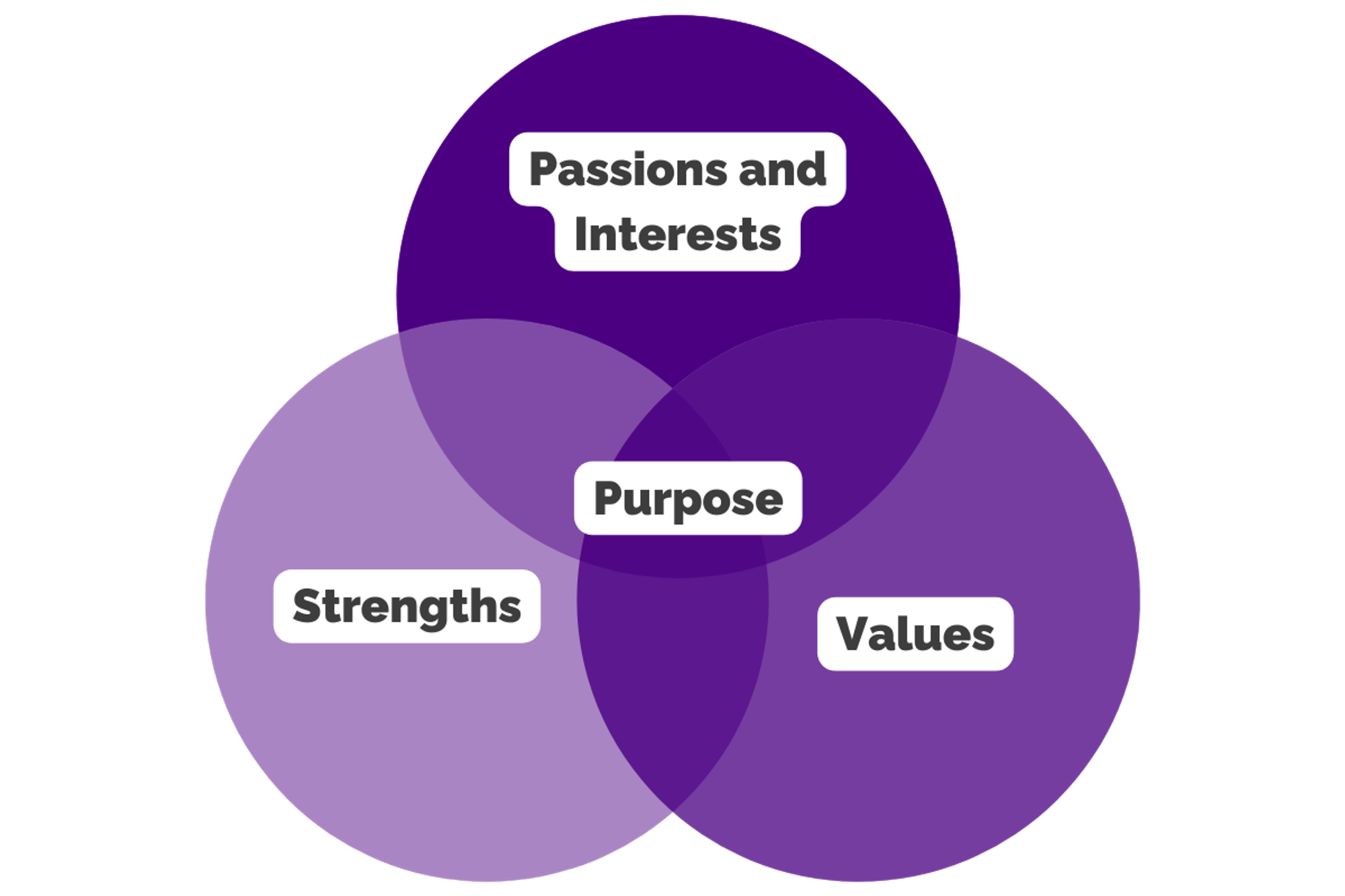Don’t Know What Career You Want? Start Here.
Achieving Goals, Career Discovery, Career Enrichment, Career Transitions, Self Awareness

Can you relate?
You’re right out of high school or college, you’ve got the whole world ahead of you, you’re daydreaming about your new career and feel like you have a myriad of career choices in front of you. It feels all lined up, everything is in place, there’s a plan.
And then life happens and time passes, and you wake up one day and you find yourself saying “How did I get here?” and “I don’t know what career I want anymore.” Maybe life got so busy, you forgot to pay attention to what you needed, what your interests were, or what you were passionate about.
Or maybe yet, you’ve only been out of college for a few years now and the promises of career clarity from your degree program – or the lack of it – have you wondering what you want to do with the rest of your life. Maybe you feel like you don’t know how to get the job you want or what that job even is.
Ask yourself these questions to uncover what career you might want
Before jumping into a complex job market without clarity around what it is you’re actually looking for, spend some time seeking the answers to these questions.
Don’t let the external job market dictate your career path or decisions about what the right career is for you. Instead, conduct internal investigations first: revealing your vision, clarifying your interests, articulating your strengths, filling in any gaps, and deciding what the best fit is for you.
For more specifics on a step-by-step guide to asking these important questions, check out Coach Brooke’s breakdown of Ama La Vida’s career transition process.

What does my “dream job” look like?
Spoiler: there’s no such thing as a “dream job.” Well, at least in the sense you might be thinking about it. Your dream career is the career you decide is the right fit for you that contributes to the overall life you are building and growing.
Ask yourself: what are the practical things I need this career to provide?
- What work environment do I want and who do I want to be working with?
- Do I prefer in-person, remote, or perhaps hybrid? What fits my lifestyle and social interaction needs?
- What plans do I have for my whole life? How do I need my career to fit into those?
- How much money/benefits will I need to support myself/my family, create the life I want, and have what I need?
- Do I seek freedom in how I spend my time at work or do I thrive in a more structured environment?
So, instead of starting with “what is the name of the career/job that I need to target,” know what you want out of the practical pieces of your career and get clear about how you need work to function in your life.

What industry or industries interest me?
Now that you have an understanding of how you want your career to fuel your life, it’s time to focus on what industries or companies have paths that fit. These days, there seem to be as many career options as there are people, so having a focus is key to making progress.
- Are there companies that you have followed for a while, whose products you love or who serve a purpose that aligns?
- Are there organizations with ideas you believe in and want to support?
- Do you have connections who work somewhere you’ve always thought sounded amazing?
Start a list! Whether you’re jotting it down on paper, keeping it in a spreadsheet, or using a job search platform to track, keep a list and look for patterns around what keeps coming up for you.
What type of work suits my interests, skills and personality?
The sweet spot of a fulfilling career for many people is at the intersection of passions, values, and strengths.
Picture it as a Venn diagram of overlapping circles and we’re all aiming for that one little section that overlaps them all. A key point is that clarity around these 3 areas is effective in narrowing down the seemingly limitless possibilities of career choices.

Pro tip: Some of us, in different seasons of our lives, don’t necessarily want to fulfill our passions inside our careers. Don’t feel like your work has to be the one and only answer to serving your passions, values, and strengths. Instead, understand these things about yourself. Naming them clearly will help you know how you need work to contribute to them!
- What am I passionate about and how do I want work to intersect with those things?
- What am I interested in and curious about?
- What do I value in life, in the world, and in work?
- What strengths do I have, both innate and developed?
Research different career paths
Now that you’ve focused your inquiry internally, it’s time to turn outward to see what’s out there. You’ll want to explore general information about career paths as well as specific jobs being advertised. You’ll begin to figure out what is a strong match for your needs, your interests, and your path as you continue to investigate.
You can engage with O*NET Online, a robust database about all occupations from the Department of Labor. This allows you to understand in-demand careers, requirements for different paths, info on salaries, and growth opportunities for thousands of potential careers.
Read different job descriptions
Once you have an understanding of what paths could be a good fit, start job researching by looking at ads to see what’s out there. What company keeps catching your eye? What position(s) meet your needs and interests? Keep a list of phrases, keywords, requirements, etc. that you see that matches what you learned about yourself.
Soon, you’ll start to piece together an understanding of what’s out there, what employers are looking for, and where your next step might lie.
Note: This process of researching is different from searching for jobs. You are not reading every job description you see and scrutinizing it as a potential fit. You are researching what’s out there. Suspend that urge to rule things in or out based on how you feel about your qualifications and ability. Take in information, keep track of what you learn, and then look for patterns.
Volunteer
Now that you’ve investigated online, it’s time to turn to real-world, people-focused investigation. The best and most informative kind! Volunteering helps you build new skills, gain experience, and understand new worlds of work and impact, and can clue you in on new potential paths and opportunities.
Beyond hands-on experience that you can leverage in a new way, you will meet new people in spaces new to you. You can learn from like-minded AND differently-minded people to better understand what a great fit can be for your career path.
Consider either using a strength you have to help in an industry new to you OR building a new strength in a familiar industry or initiative. Opportunities abound to volunteer locally and remotely (for example, platforms like Catch a Fire provides skill-based matching between volunteers and nonprofits seeking support).

Conduct informational interviews
What the heck is an informational interview? It’s different from a job interview; informational interviews are simply talking to professionals to learn something from them about their own experiences, their companies, specific jobs, or a new industry. Making connections this way is integral to getting that real-world perspective on how other people have succeeded and carved their path.
For example, if I’ve had a continued interest in environmental advocacy, but I don’t know anyone in that space, I would benefit from combing through LinkedIn and finding a handful of folks working at organizations I’m passionate about and setting up informational interviews. I want to ask them questions about how they got there, about what their day-to-day is like, and maybe for some advice about how to plan my own path.
The key to informational interviews is to prepare! Ask yourself these questions:
- Who do I want to learn from?
- Where do I find these people?
- What questions would I like to ask them?
Be sure to take notes, follow up with a thank you note, and as always, look for patterns.

Make a career plan
So, you’ve done some internal investigation, you’ve done job research in the external world of jobs, and you’ve made personal connections through human-to-human interactions. Now, let’s connect the dots through career planning (check out this blog post to understand why this is a critical step).
- Write down what you’d ideally like this journey of your career path to look like based on everything you learned (don’t worry about limiting yourself in this “ideal” scenario just yet).
- Present this to someone you trust, maybe your coach, mentor, partner, or friend, and talk it through with them. Ask for feedback; it’s one thing to write it down, but a whole new experience to name it out loud to someone else.
- What jobs meet the steps along this path you’ve created? What are the rest of the components that you want to address in this plan that live beyond the job itself?
Will you need additional education?
Consider whether your ideal plan will require more education and weigh your options. Would a course or certification be an entry ticket into this path? Could you self-educate and read books to gather industry knowledge? In order to pursue a career path, you’ll want to listen to others who are in the career field, people doing the actual work and the hiring, about what training and education is absolutely necessary to be successful.
Vet potential training opportunities by comparing them to industry standards listed on professional association websites, information you gathered from people in the field, and job descriptions.
How to start
A great place to start in taking action on figuring out your career path is right where you are! Look around your immediate surroundings and start asking around and exploring what other people do. Remember, figuring out your career path is an investigative mission! You don’t have to go far to find new information or inspiration. Of course, it’s ok to ask for career advice from friends and family, but be aware they may not know what you want personally or have insider information about industry and job market trends.
That’s why working with a career coach can be so helpful. If you’re interested in uncovering the right career path for you, the one that will provide a work experience that fuels the life you’re crafting, AND you’ve decided you’re ready to take action, reach out to us to discuss ways to take that first step!


